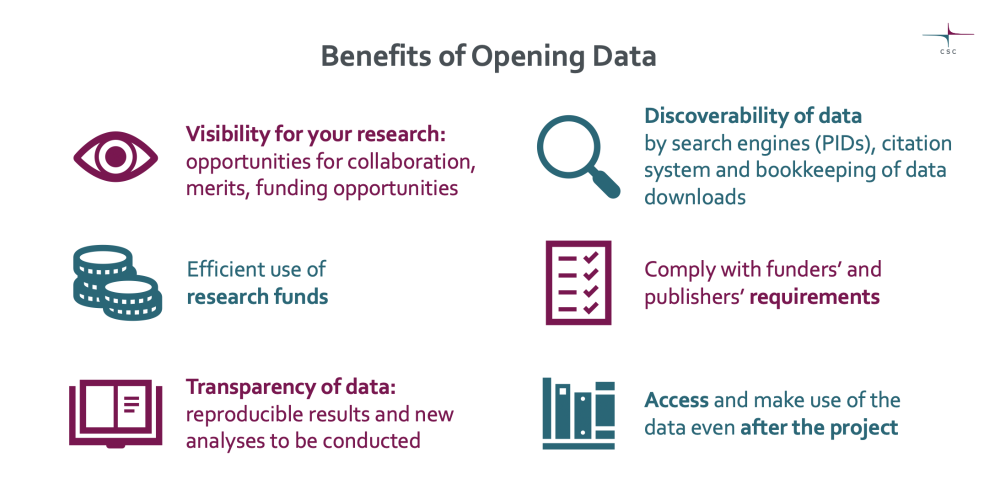Publish & discover data
Publishing and reusing data are increasingly important parts of the scientific process.
Publishing research data
- The rule of thumb is to make the data as open as possible, as closed as necessary.
- Consider intellectual property rights, legal and ethical issues when publishing data.
- It is recommended to publish at least the discovery metadata. Read more about publishing discovery metadata in Docs CSC.
- The published data should also have a persistent identifier, which enables citations as well as a license. These allow other people to discover your data and make it reusable.
Read more in our guide on publishing research data in Docs CSC.

Discover research data
Existing research datasets may be available for reuse.
- When utilizing and reusing data collected or produced by others, the origin, content, location, license, restrictions of use, and other necessary information are needed.
- Search services include descriptive information (metadata) on research datasets.
- The better the description of the dataset is, the easier it is to find and use it.
Read more about dataset sources in Docs CSC.
Services for publishing and discovering general research data
Services listed below are Finnish or produced in collaboration with CSC. They are free-of-charge for end users.
- In addition to the services listed here, there are multiple recommended repositories available. You can search for suitable options at Re3data, the Registry of Research Data Repositories.
- Contact your home organization data support for more guidance regarding publishing and discovering research data.
Fairdata Services
Research Data Repository
Integrated services for storing, publishing and sharing research data

EUDAT CDI B2SHARE
Research data storage and publishing service
A service for storing, publishing and discovering research data, supporting FAIR principles
Discipline-specific services
If possible, use discipline-specific repositories for your data.
Life sciences and geosciences
Databases and resources for biomolecular data and spatial data:
- ELIXIR Core Data Resources
- ELIXIR Deposition Databases for biomolecular data
- EBI data submission wizard
Paituli
Spatial Data Download Service
An open service for downloading and sharing spatial data
Social sciences and language resources
Deposition and resources for digital humanities, interviews, and language research (in text, speech, and video formats):
Sensitive data
If you plan to share or publish your sensitive data, you must ensure that the data is appropriate and safe to share. Read more about CSC’s Sensitive Data services.